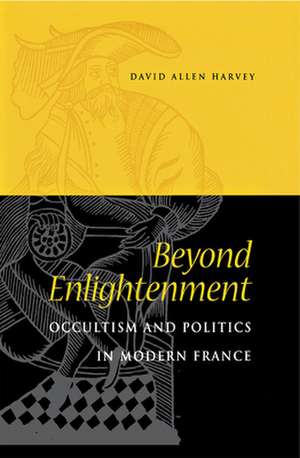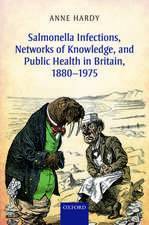Beyond Enlightenment: Occultism and Politics in Modern France
Autor David Allen Harveyen Limba Engleză Hardback – 27 iun 2005
The occult sciences have attracted followers and fascinated observers since the middle ages. Beyond Enlightenment examines the social, political, and metaphysical doctrines of Martinism, a French occultist movement and offshoot of Freemasonry that flourished from the late eighteenth century to the dawn of the twentieth century. The French Revolution and the disorder that followed it convinced Martinists that modern society was on the wrong path. For guidance they looked back not to the corrupt Old Regime but rather to a lost golden age of mankind that existed only in their imagination. The Martinists were closely engaged in the political events of their times, and rightly or wrongly, they earned a reputation for secret intrigue and ubiquitous hidden influence.
David Allen Harvey focuses on the Martinists themselves, recreating their own social and political views. He traces the birth of Martinism during the Enlightenment, its revival in the fin de siècle, and the late nineteenth-century formation of a distinctly Martinist project-the synarchy-aimed at the social and political renewal of France and the greater world. The Martinist doctrines formed a unique synthesis of Enlightenment and counter-Enlightenment thought. Harvey maintains that Martinists were a peaceful, esoteric society that rejected both secular materialism and dogmatic Catholicism, seeking to reveal the hand of Providence in history, discover divinely inspired laws of social and political organizations, and enact the kingdom of heaven on earth.
Seeking to explore and analyze the "irrational" side of the "Age of Reason," Beyond Enlightenment is a welcome addition to recent studies of esoteric movements. Historians of culture, religion, and politics in post-Revolutionary France, as well as historians of esotericism and alternative religions will be interested in this engaging and revealing study.
David Allen Harvey focuses on the Martinists themselves, recreating their own social and political views. He traces the birth of Martinism during the Enlightenment, its revival in the fin de siècle, and the late nineteenth-century formation of a distinctly Martinist project-the synarchy-aimed at the social and political renewal of France and the greater world. The Martinist doctrines formed a unique synthesis of Enlightenment and counter-Enlightenment thought. Harvey maintains that Martinists were a peaceful, esoteric society that rejected both secular materialism and dogmatic Catholicism, seeking to reveal the hand of Providence in history, discover divinely inspired laws of social and political organizations, and enact the kingdom of heaven on earth.
Seeking to explore and analyze the "irrational" side of the "Age of Reason," Beyond Enlightenment is a welcome addition to recent studies of esoteric movements. Historians of culture, religion, and politics in post-Revolutionary France, as well as historians of esotericism and alternative religions will be interested in this engaging and revealing study.
Preț: 391.26 lei
Nou
Puncte Express: 587
Preț estimativ în valută:
74.87€ • 78.17$ • 61.96£
74.87€ • 78.17$ • 61.96£
Carte tipărită la comandă
Livrare economică 04-18 aprilie
Preluare comenzi: 021 569.72.76
Specificații
ISBN-13: 9780875803449
ISBN-10: 087580344X
Pagini: 275
Ilustrații: Illustrations
Dimensiuni: 152 x 229 x 23 mm
Greutate: 0.59 kg
Ediția:1
Editura: Northern Illinois University Press
Colecția Northern Illinois University Press
ISBN-10: 087580344X
Pagini: 275
Ilustrații: Illustrations
Dimensiuni: 152 x 229 x 23 mm
Greutate: 0.59 kg
Ediția:1
Editura: Northern Illinois University Press
Colecția Northern Illinois University Press
Recenzii
"Well written, cogently and compellingly argued.... A valuable contribution to the field."—James Deming, Princeton Theological Seminary
"Remarkably readable, an original piece of scholarship.... Impressive for its lucid, balanced, sensible, and well-informed handling of complex issues and at times exasperatingly obscure concepts."—Jonathan Beecher, University of California, Santa Cruz
"Deserves a large readership in French intellectual history."—American Historical Review
"Remarkably readable, an original piece of scholarship.... Impressive for its lucid, balanced, sensible, and well-informed handling of complex issues and at times exasperatingly obscure concepts."—Jonathan Beecher, University of California, Santa Cruz
"Deserves a large readership in French intellectual history."—American Historical Review
Notă biografică
David Allen Harvey is Assistant Professor of History at the New College of Florida and is the author of Constructing Class and Nationality in Alsace, 1830–1945.
Cuprins
Table of Contents
Acknowledgments
Introduction
1 The Faustian Moment
2 Imagined Histories
3 Invented Traditions
4 The Boundaries of the Occult Community
5 Political Prophecies
6 Does French Fascism Have Occult Roots?
7 The Heavenly City of the Martinists Conclusion
Appendix—Prophecies of Olivarius and Orval
Notes
Bibliography
Index
Introduction
1 The Faustian Moment
2 Imagined Histories
3 Invented Traditions
4 The Boundaries of the Occult Community
5 Political Prophecies
6 Does French Fascism Have Occult Roots?
7 The Heavenly City of the Martinists Conclusion
Appendix—Prophecies of Olivarius and Orval
Notes
Bibliography
Index
Descriere
The occult sciences have attracted followers and fascinated observers since the middle ages. Beyond Enlightenment examines the social, political, and metaphysical doctrines of Martinism, a French occultist movement and offshoot of Freemasonry that flourished from the late eighteenth century to the dawn of the twentieth century. The French Revolution and the disorder that followed it convinced Martinists that modern society was on the wrong path. For guidance they looked back not to the corrupt Old Regime but rather to a lost golden age of mankind that existed only in their imagination. The Martinists were closely engaged in the political events of their times, and rightly or wrongly, they earned a reputation for secret intrigue and ubiquitous hidden influence.
David Allen Harvey focuses on the Martinists themselves, recreating their own social and political views. He traces the birth of Martinism during the Enlightenment, its revival in the fin de siècle, and the late nineteenth-century formation of a distinctly Martinist project-the synarchy-aimed at the social and political renewal of France and the greater world. The Martinist doctrines formed a unique synthesis of Enlightenment and counter-Enlightenment thought. Harvey maintains that Martinists were a peaceful, esoteric society that rejected both secular materialism and dogmatic Catholicism, seeking to reveal the hand of Providence in history, discover divinely inspired laws of social and political organizations, and enact the kingdom of heaven on earth.
Seeking to explore and analyze the "irrational" side of the "Age of Reason," Beyond Enlightenment is a welcome addition to recent studies of esoteric movements. Historians of culture, religion, and politics in post-Revolutionary France, as well as historians of esotericism and alternative religions will be interested in this engaging and revealing study.
David Allen Harvey focuses on the Martinists themselves, recreating their own social and political views. He traces the birth of Martinism during the Enlightenment, its revival in the fin de siècle, and the late nineteenth-century formation of a distinctly Martinist project-the synarchy-aimed at the social and political renewal of France and the greater world. The Martinist doctrines formed a unique synthesis of Enlightenment and counter-Enlightenment thought. Harvey maintains that Martinists were a peaceful, esoteric society that rejected both secular materialism and dogmatic Catholicism, seeking to reveal the hand of Providence in history, discover divinely inspired laws of social and political organizations, and enact the kingdom of heaven on earth.
Seeking to explore and analyze the "irrational" side of the "Age of Reason," Beyond Enlightenment is a welcome addition to recent studies of esoteric movements. Historians of culture, religion, and politics in post-Revolutionary France, as well as historians of esotericism and alternative religions will be interested in this engaging and revealing study.











